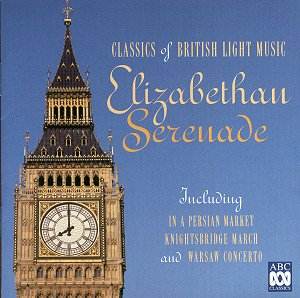What is light music? Lyle Chan,
in an exceptionally interesting and informative essay which accompanies
this issue, helps us out. Light music as we understand it today has its
origins in the entertainment provided for well-off and well-to-do people
in the latter part of the nineteenth century, which was to be heard primarily
in the foyers and lounges of the quality hotels where these kind of people
went on holiday or to “take the waters”. From this world comes the expression
“Palm Court”, which has entered the language
without most of us knowing what it means or where it appeared from. The
proliferation of this kind of music was far from being an exclusively
English phenomenon, but it’s true to say that as the new century became
established there was a huge increase in its popularity and demand in
England, even as it declined elsewhere. We
learn that in the 1920s, each time a patron of the Lyons chain of restaurants settled his bill he was contributing to the estimated
cost of £150,000 per year to keep the musicians in work. In the decades
before 1950 the BBC employed no fewer than eight full-time light orchestras,
and the enormous amount of work available meant that the best musicians
managed to earn a very good living indeed.
It’s interesting to see the name
Edward Elgar on the list of composers featured here. I don’t think anybody
would cite even the “Enigma” Variations is an example of light music, and certainly
not the symphonies or Gerontius,
to stay only with the better known works. But Chanson
de Matin more than earns its place in the present company.
First of all, it isn’t too long: at three and half minutes it can hold
the attention of even the most fidgety person. Secondly, it is melodious
and easy to take in at a single hearing; in a word, undemanding. Listening
to this relatively early work of Elgar’s, one is struck, all the same,
by the fact that there is a different level of musicianship at work
here than in many of the other pieces, and I think this has to do with
development. Truth to say, by Elgar’s own standards, there isn’t much
in the way of development in this little piece, but when he brings back
a theme he is perfectly capable of embellishing it or drawing it out
with a sequence or two, or perhaps, as in a charming moment just before
the end, surprising the listener by taking the end of the phrase up
an octave. Almost without exception development even of such rudimentary
kind is absent from the music in this programme, and it is this which
tends to discourage me from wanting to play the whole disc in one sitting.
Take as an example the very first
piece on the disc, the Elizabethan
Serenade by the wonderfully named Ronald Binge. The opening
provokes a smile of recognition: how familiar this melody is – why?
the Light Programme? the test card? – and how reassuring, taking us
back so far and so effortlessly! But then of course it’s a most beguiling
tune, and one which defies analysis, since its contours, relying as
they do on simple arpeggio figures, could scarcely be simpler or less,
seemingly, original. Yet, once heard, the tune stays stubbornly in the
mind. So it does in the piece, too, however, and this is the first manifestation
of what seems to me the main weakness of the music on this disc, for
there is little or no development. Binge has conjured up his lovely
melody but then either can’t or doesn’t want to do anything with it
apart from play it again with limited changes of instrumentation.
The programme seems to have been
well chosen to reflect a wide range of British music of the period.
As with Elizabethan Serenade,
many readers will recognise the pieces by Eric Coates, perhaps, like
me, without knowing why. Surprisingly, perhaps, in a collection like
this, we get no Dam Busters
but we do get Ron Goodwin’s 633 Squadron,
its cross rhythms reminiscent of America from West Side Story. Other highlights include
the same composer’s “wrong note” sailor’s hornpipe and of course the
Warsaw Concerto, so well done, the writing
for the solo piano in particular, that you can almost see the long,
gloomy frame of Rachmaninov himself seated at the instrument. On the
other hand, the Beatles arrangements with which the disc ends are very
saccharine and did absolutely nothing for this particular child of the
sixties.
This is a compilation album of
performances recorded in Australia between 1980 and 2002, plus one performance, the Ketèlbey, which is
taken from a Decca album released in 1959. For the most part the performances
are accomplished and convincing, though I was surprised by the less
than taut rhythms of the Australian Army Band in 633
Squadron, as I also was by their rather cosy romp through
Colonel Bogey. And though I was happy enough
to rediscover In a Persian Market,
a piece I used to fumble my way through on the piano as a boy, I do
wonder if the New Symphony Chorus of London singing “Baksheesh, baksheesh,
Allah!” down their noses is acceptable nowadays.
William Hedley


